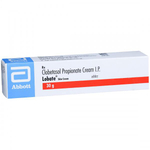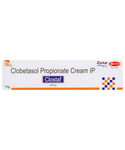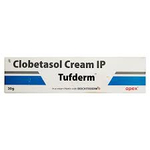viclob
Viclob Cream is a topical medication used for various skin conditions.
Before applying the medicine, ensure that you clean and dry the affected area as directed on the label after applying the medication, remember to wash your hands, unless your hands are the affected area. Stick to the prescribed dose and duration for the best results.
It's important to be aware of the following precautions:
Prolonged use of clobetasol can lead to skin thinning or atrophy, especially in areas with thinner skin, such as the face and intertriginous areas (areas where skin contacts skin, like the armpits and groin). To prevent this, limit the duration of use and avoid excessive application.
Topical corticosteroids like clobetasol can be absorbed into the bloodstream, especially if used on large areas of the body or under occlusive dressings. This can potentially lead to systemic side effects, so it's crucial to use the smallest effective amount for the shortest duration.
Common side effects of clobetasol may include skin atrophy, telangiectasia (visible blood vessels), skin irritation, and dry skin. If you miss an application, apply it when you remember.
If you skip the missed one and continue with your regular schedule. Avoid taking two doses at once, and consult your doctor for guidance on managing missed doses effectively.
Similar Medicines
Available in 2 variations

Viclob Ointment
Viclob Ointment
Clobetasol
tube of 20 gm Ointment

Viclob Cream
Viclob Cream
Clobetasol (0.05% w/w)
tube of 30 gm Cream
Related Faqs

Does Viclob cause severe skin reactions?
Instances of severe skin reactions with Viclob are rare Viclob is a medication renowned for its antiinflammatory properties and is commonly used to alleviate skin diseases reactions and eczemas However individuals who demonstrate hypersensitivity to Viclob may experience skin reactions To prevent such reactions it is advisable to refrain from applying occlusive dressings as they can hinder airflow and exacerbate the skin While Viclob itself may not be the direct cause of skin reactions the additional ingredients incorporated into the medication can elicit adverse responses in certain cases Should you notice any skin reactions it is crucial to promptly inform your healthcare provider By doing so they can provide appropriate guidance and intervention if necessary

Can I stop taking Viclob when my symptoms are relieved?
It is important to continue taking Viclob as prescribed without interruption even if you start to feel better Although you may experience an improvement in your symptoms earlier on it is crucial to complete the full course of treatment Discontinuing Viclob prematurely can lead to a recurrence of your symptoms This medication is specifically designed to combat the underlying cause of your condition and stopping it too soon may hinder its effectiveness By adhering to the recommended duration of treatment you give Viclob the opportunity to fully eradicate the infection or address the underlying issue ensuring a more successful outcome It is essential to prioritize your longterm wellbeing and follow the instructions provided by your healthcare professional If you have any concerns or questions regarding your treatment it is advisable to consult with your doctor for further guidance Remember persistence and compliance are key to achieving optimal results with Viclob

Does Topisone cause severe skin reactions?
Topisone an antiinflammatory medication is commonly prescribed for the treatment of various skin diseases reactions and eczemas Fortunately severe skin reactions with Topisone are extremely rare However individuals who have a hypersensitivity to this drug may experience skin reactions It is crucial to avoid using occlusive dressings such as air and watertight dressings after applying Topisone as they can potentially cause skin reactions Although the medication itself may not be the direct cause of the reaction certain additives or excipients present in the formulation can trigger a reaction in some individuals Therefore if you notice any skin reactions after applying Topisone it is imperative to promptly inform your healthcare provider They will be able to assess the situation and provide appropriate guidance or alternative treatment options if necessary Overall while the occurrence of severe skin reactions with Topisone is uncommon it is important to remain vigilant and seek medical attention if any adverse reactions are experienced

Does Bariderm Z cause severe skin reactions?
Severe skin reactions are quite rare with Bariderm Z. Bariderm Z is an anti-inflammatory drug which is used to treat skin diseases, skin reactions and eczemas. However, skin reactions can occur in a person who is hypersensitive to Bariderm Z. It is important to leave the affected area open after applying Bariderm Z as using occlusive dressings (air- and water-tight dressing) can lead to skin reactions. The medicine may not itself cause a reaction but the added excipients with the medications can lead to a reaction in some cases. Inform your doctor immediately in case you encounter any skin reactions.

Does Clo B cause severe skin reactions?
Severe skin reactions are quite rare with Clo B. Clo B is an anti-inflammatory drug which is used to treat skin diseases, skin reactions and eczemas. However, skin reactions can occur in a person who is hypersensitive to Clo B. It is important to leave the affected area open after applying Clo B as using occlusive dressings (air- and water-tight dressing) can lead to skin reactions. The medicine may not itself cause a reaction but the added excipients with the medications can lead to a reaction in some cases. Inform your doctor immediately in case you encounter any skin reactions.

Can Zebet be applied in children?
Zebet should be avoided in children under the age of 1 Additionally caution should be exercised when prescribing this medication to older children and adolescents as they are more susceptible to experiencing side effects One notable risk in the pediatric population is the potential suppression of the immune system leaving the child vulnerable to various illnesses and atrophic changes As a result it is generally advised against using this medication in children However in rare instances where the benefits outweigh the risks a doctor may still opt to prescribe Zebet In such cases the treatment duration is usually limited to five days and the therapy is closely monitored with weekly reviews to ensure the childs wellbeing
Related Posts

1:15
4 Amazing benefits of eating Lychee this summer!

1:15
Gond Katira: Nutrition and Benefits for a Healthier Life!

1:15
What Happens When You Use Marijuana? Find Out What You Need to Know!

1:15
Top 7 Amazing Health Benefits of Jackfruit!

1:15
Struggling with Thyroid Issues? How Does It Affect Women's Health?























.svg)
